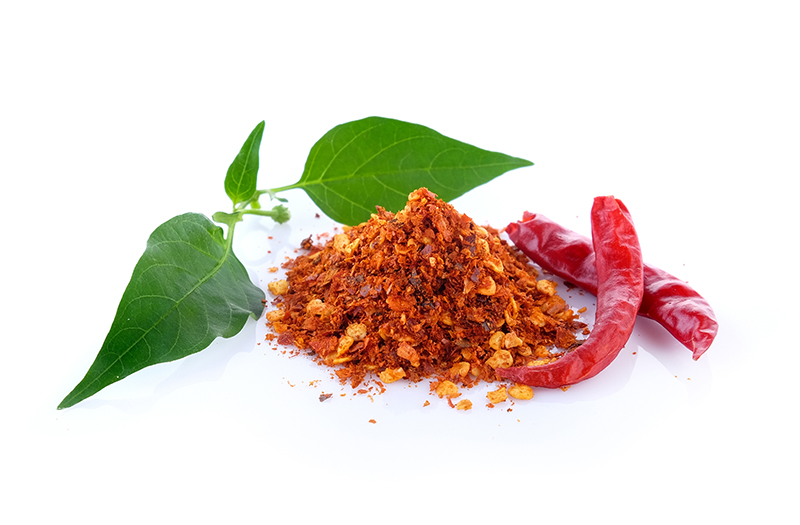
Studies have shown Potential Benefits:
Boost metabolism, weight loss, heart health, appetite control & decreased belly fat.
Cayenne
Capsaicin is the active ingredient in Cayenne Peppers. The chili originated in Central and South America. Scientists have found that people have been eating peppers as early as 7000 B.C. Cayenne has been used in food and Traditional Chinese and Ayurvedic medicines for thousands of years.
Boost metabolism, weight loss, heart health, appetite control, & decreased belly fat

https://pubmed.ncbi.nlm.nih.gov/29922422/ – According to these studies, cayenne has ability to help control metabolic syndrome and its related disorders such as obesity, disrupted lipid profile, diabetes and its complications. Red pepper has beneficial effects on metabolic syndrome and can decrease the risk of mortality due to cardiovascular diseases. The review included preclinical and clinical studies. Overall the paper concluded that red pepper was beneficial for hyperlipidemia, obesity, and diabetes. Specifically in relation to weight loss, the paper concluded that cayenne could play beneficial effects in weight management via increase energy expenditure, satiety, fat oxidation and thermogenesis which are the main mechanisms of anti-obesity effect of capsaicin.”
https://pubmed.ncbi.nlm.nih.gov/28424369/ – Anti-obesity – Cayenne promotes weight loss in obese individuals.
https://pubmed.ncbi.nlm.nih.gov/19056576/ – Randomized trial on decreased abdominal fat loss with cayenne. University of Maryland researchers randomized 40 men and 40 women to either 6 mg/day of cayenne (capsaicinoids) or placebo for 12 weeks. There was no significant difference in weight or overall adiposity between the groups. A statistically significant reduction in abdominal adiposity (fat) was noted in the cayenne (capsaicinoid) arm of the study.
https://pubmed.ncbi.nlm.nih.gov/27347918/ – Digestive Health – cayenne stimulates our salivary glands to begin the digestive process.
https://pubmed.ncbi.nlm.nih.gov/12627807/ – Anti-fungal
https://www.ncbi.nlm.nih.gov/pmc/articles/PMC4477151/ – Benefits by Clinical & Pre-Clinical Research: Anti-Obesity, Improved Endothelial function, Improved Metabolic Function, Decreased Acid secretion & increased alkali increased gastric blood flow benefiting the repair of gastric ulcer.
https://www.ncbi.nlm.nih.gov/pmc/articles/PMC2695870/ – Reduced appetite/hunger. This study showed that it reduces the production of the hunger hormone ghrelin.
https://pubmed.ncbi.nlm.nih.gov/15611784/ – Appetite control and Satiety. This study showed that people taking capsaicin ate less food throughout the day than those who didn’t take cayenne. Specifically, those who drank a cayenne/capsaicin-containing beverage ate 16% less. People reported feeling fuller, while eating fewer calories. Cayenne helps reduce hunger & helps you eat less.
https://pubmed.ncbi.nlm.nih.gov/20674858/ – Helped reduce blood pressure – One study in mice with high blood pressure showed that the long-term consumption of cayenne/capsaicin helped reduce blood pressure.
https://openheart.bmj.com/content/2/1/e000262 – This study showed that capsaicin helped relax blood vessels in pigs, leading to lower blood pressure showing potential for promoting vascular and metabolic health.
https://pubmed.ncbi.nlm.nih.gov/26756096/ – Digestive Health – Cayenne pepper may help boost the stomach’s defense against infections, increase digestive fluid production and help deliver enzymes to the stomach, aiding digestion.
https://pubmed.ncbi.nlm.nih.gov/16621751/ – Cayenne (Capsaicin) does not stimulate but inhibits acid secretion, stimulates alkali, mucus secretions and particularly gastric mucosal blood flow which help in prevention and healing of ulcers. Capsaicin acts by stimulating afferent neurons in the stomach and signals for protection against injury causing agents. It does this by stimulating nerves in the stomach that signal for protection against injury. This review paper has shown that the capsaicin in cayenne peppers may actually help reduce the risk of stomach ulcers. Cayenne helps improve digestive health & may help reduce the risk of stomach ulcers.
http://ar.iiarjournals.org/content/36/3/837.long – Anti-Cancer preliminary studies
https://academic.oup.com/chemse/article/37/2/103/273510 – Meta-Analyses & Critical review of effects of cayenne on energy balance. – The main active ingredient in cayenne pepper is capsaicin. Researchers believe that capsaicin is a thermogenic chemical. A thermogenic chemical may help speed up your metabolism and decrease your appetite. Evidence indicates that cayenne both augment energy expenditure & enhance fat oxidation.
https://pubmed.ncbi.nlm.nih.gov/24630935/ – showed that people who consumed cayenne with every meal felt increased feelings of fullness and had fewer cravings. The study results suggest that adding cayenne (capsaicin) to your diet can suppress your appetite. This can lead to a decrease in caloric intake and an increase in weight loss.
https://pubmed.ncbi.nlm.nih.gov/14649970/ – Boost metabolism When metabolism is faster, your body is more likely to convert nutrients into energy instead of stored fat.
https://pubmed.ncbi.nlm.nih.gov/21093467/ – Thermogenesis
https://link.springer.com/chapter/10.1007/978-3-0348-0828-6_9 – Anti-inflammatory & gastroprotective properties- This study found that capsaicin has anti-inflammatory and gastroprotective properties. The researchers gave supplements to 198 healthy participants and 178 participants with gastrointestinal conditions. Both groups experienced gastrointestinal benefits from the daily consumption of cayenne.
https://pubmed.ncbi.nlm.nih.gov/20674858/ – Helps blood pressure – This study conclude that dietary capsaicin improves endothelial function which may represent a promising target for therapeutic intervention of hypertension.
https://pubmed.ncbi.nlm.nih.gov/23844093/ – The capsaicin in cayenne peppers has metabolism-boosting properties.
It helps increase the amount of heat your body produces, making you burn more calories per day.
https://pubmed.ncbi.nlm.nih.gov/23179202/ – In this study people who ate a breakfast containing MCT oil & capsaicin and burned 51% more calories during that meal, compared to people who had neither for breakfast.
https://pubmed.ncbi.nlm.nih.gov/10743483/ – reduces hunger – Many studies show the capsaicin in cayenne peppers helps reduce hunger.
https://pubmed.ncbi.nlm.nih.gov/19345452/ – Cayenne & Green Tea suppressed appetite & hunger.
https://pubmed.ncbi.nlm.nih.gov/25675368/ – Biological activities of Cayenne: cardio protective, anti-inflammatory, analgesic, thermogenic, gastro-intestinal health.
https://www.ncbi.nlm.nih.gov/pmc/articles/PMC4477151/ – Metabolic health & cardiovascular health
https://www.ncbi.nlm.nih.gov/pmc/articles/PMC5426284/. Cayenne has beneficial effects on appetite, satiety, leptin resistance, modulates intestinal hormones & microbiome, helps control body temperature, & suppresses body fat accumulation.
